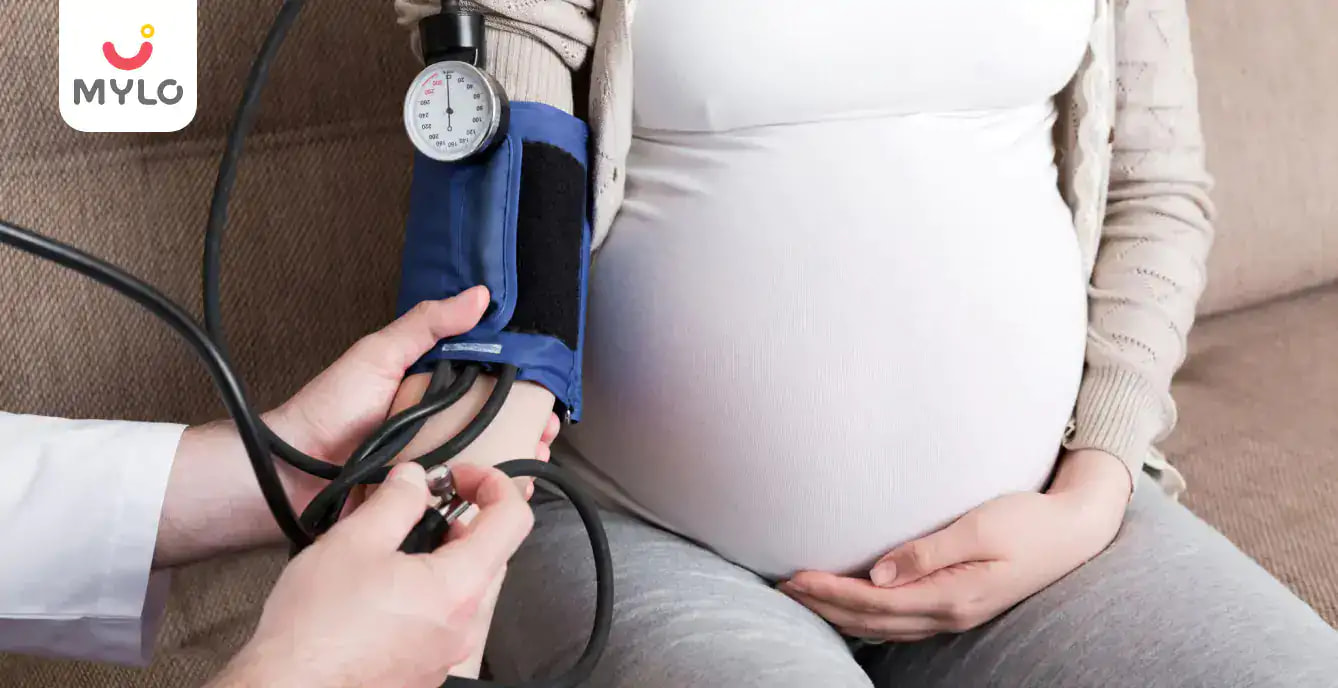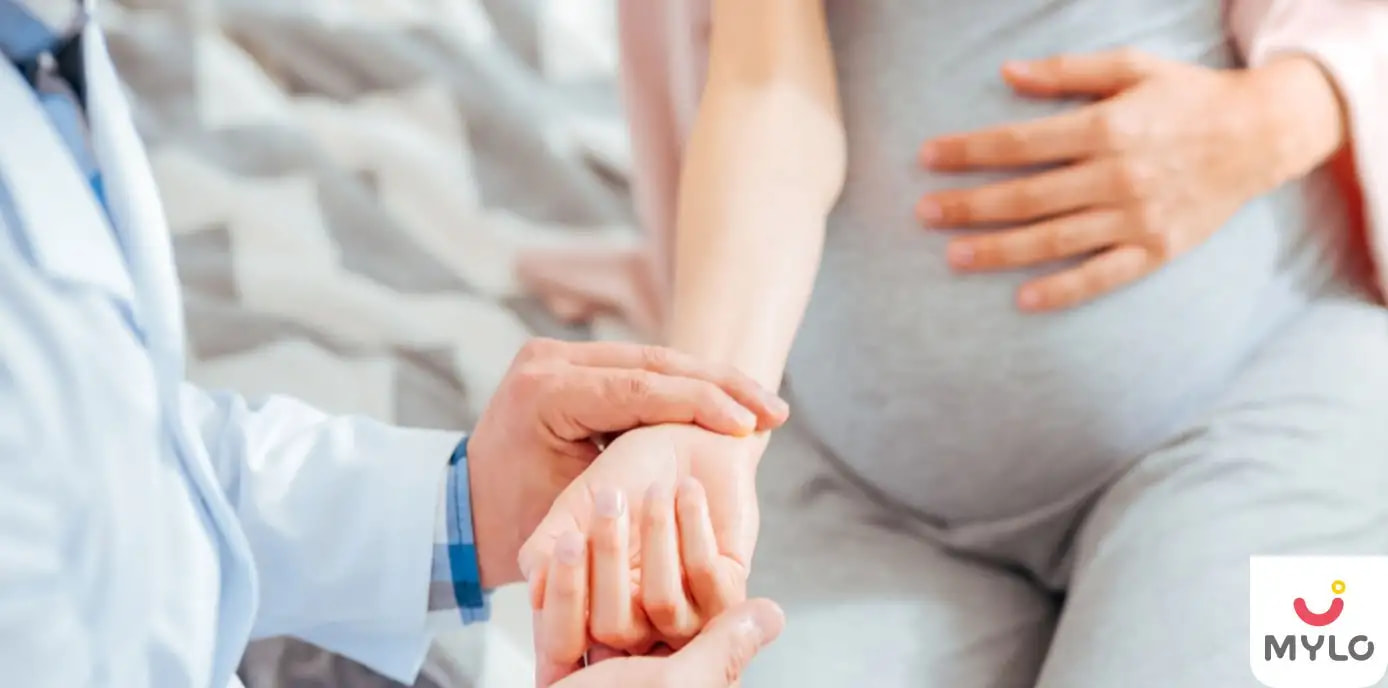Home

Preeclampsia

Symptoms & Management of High Blood Pressure in Pregnancy
In this Article

Preeclampsia
Symptoms & Management of High Blood Pressure in Pregnancy
Updated on 3 November 2023
It is usually said that it is not easy to please a woman. But, there is one news that will surely make any woman, and that is of being pregnant. Experiencing a life growing within you is no less a magical feeling. Your priorities immediately change, and you do everything in the world to make sure that your baby is born healthy and safe.
Did you think every pregnancy was a smooth one? Unfortunately, not. A woman has to go through many struggles, physical and mental. Diabetes, high blood pressure, uneasiness, lethargy, hypertension, etc., are a few of the many things that a woman undergoes to bring a child into this world. Not all of these are harmless; some can be life-threatening too. Therefore, it is very important to recognize these problems before it becomes a problem for you and your fetus. Today, we will discuss one such problem that women usually face during pregnancy: high blood pressure in pregnancy. We will also discuss in detail the complications arising from it. So, let’s get started.
What Is High Blood Pressure?
Blood pressure is the force exerted by blood against the walls of blood vessels. As a result, blood is pumped from the heart into the arteries (blood vessels) that deliver it throughout the body. High blood pressure, alternatively referred to as hypertension, is a condition in which the pressure in the arteries exceeds the usual range.
What Is High Blood Pressure In Pregnancy?
High blood pressure in pregnancy might affect the body differently than it would otherwise. As a result, pregnant women with high blood pressure are more likely to have difficulties before, during, and following childbirth. Pregnant women's health is in jeopardy due to high blood pressure, but the baby's health is also at risk.
As a result of high blood pressure in pregnancy, the infant’s supply of nutrients and oxygen may be restricted. Premature birth, low birth weight, abruption, and other difficulties for the newborn can result from this.
Symptoms Of High Blood Pressure In Pregnancy
Symptoms of high blood pressure in pregnancy can be modest or even go missed in some women. Being aware of the symptoms of high blood pressure in pregnancy is critical while you are pregnant due to the numerous changes that occur.
It is possible to diagnose gestational hypertension if one's blood pressure rises to 140/90 or higher when pregnant. Pregnant women with 160/110 are said to have severe hypertension. 120/80 is a normal blood pressure reading.
It's important to know the warning signals of high blood pressure during pregnancy:
- Headaches of the most severe kind.
- Vomiting or nausea
- Urine with too much protein (a sample of your urine is collected at every doctor’s visit during pregnancy)
- Visionary shifts.
- Ache in the upper abdomen.
Causes Of High Blood Pressure In Pregnancy
Some pregnant women are more likely to develop high blood pressure than others. Here are a few conditions that make you more likely to develop hypertension:
- If you are on the way to having your first newborn.
- If your sister or mother already has had a history of high blood pressure in pregnancy.
- If you are 40+ years old.
- If you were overweight when you conceived.
- If you have twins or triplets inside your belly.
- If you are of the African American race.
- If you have already had high blood pressure pre-pregnancy.
Home Remedies To Control High Blood Pressure In Pregnancy
There are many home remedies that will help in reducing high blood pressure in pregnancy. Some of them are:
- Apple Cider Vinegar
- Exercise
- Eating Bananas
- Controlling the intake of sodium.
- Avoiding stress.
- Proper magnesium intake.
- No smoking and drinking liquor
- No junk food
- No caffeine
There are plenty of ways to manage high blood pressure during pregnancy. First and foremost is ensuring that you do not miss a single prenatal appointment with your doctor. If your doctor has put you on any medication, make sure that you take all the medicines on time every day. Finally, change your lifestyle to a healthier one with the right type of food and exercise. Needless to say, caffeine, smoking, and drinking are a big NO!
Types Of High Blood Pressure In Pregnancy
Here are some common types of high blood pressure during pregnancy:
1. Chronic Hypertension
This is pre-existing hypertension, which you had before getting pregnant. Before the 20th week of pregnancy, high blood pressure can also be called pre-eclampsia. Pregnant women with high blood pressure may not realize it until their first prenatal appointment with their doctor. Preeclampsia and other dangerous complications might arise due to untreated chronic hypertension. Even if it is borderline high blood pressure in pregnancy, you must definitely visit a doctor.
2. Gestational Hypertension
After the 20th week of pregnancy, your blood pressure will rise. This hypertension isn't harmful to you or your baby the vast majority of the time. You may not even be experiencing any additional signs or symptoms. However, this sort of hypertension can be pretty dangerous in some cases. Your baby may be born smaller than usual due to this (have a low birth weight). Because of this, your kid may be born early. Preeclampsia is a possible outcome. This can lead to an increased risk of developing high blood pressure in the future, despite the fact that it typically subsides within three months following childbirth.
3. Chronic Hypertension With Superimposed Preeclampsia
This is an issue that women with chronic hypertension before pregnancy face. Such women suffer from worsening high blood pressure, the existence of protein in their urine and other complications related to high blood pressure in pregnancy.
4. Preeclampsia
Preeclampsia is a severe complication of high blood pressure in pregnancy. It usually develops 20 weeks after pregnancy but in some cases, it can be seen developing within 48 hours of childbirth as well. If not treated on time, it has the potential to damage other organ systems too. Earlier, it was considered that only pregnant women with high blood pressure and protein in their urine were diagnosed with preeclampsia. However, the latest research suggests that preeclampsia can occur without the presence of protein in the urine.
Pre-eclampsia and Eclampsia are both the by-products of high blood pressure or hypertension and protein existence in pregnant women. Pre-eclampsia in pregnancy is the preliminary effect of high blood pressure. If pre-eclampsia is not recognized and treated on time, it goes to the next severe stage and becomes Eclampsia. Eclampsia is characterized by seizures and sometimes coma too.
Pre-eclampsia and Eclampsia occur after 20 weeks of pregnancy but can also develop post-childbirth within 48 hours. Still, research also shows that pre-eclampsia can also show up until 4-6 weeks after childbirth. If pre-eclampsia, formerly known as toxaemia of pregnancy, is not treated on time, there is a survey which shows that one out of every 200 women has been diagnosed with Eclampsia.
Signs And Symptoms Of Preeclampsia
The signs and symptoms of Preeclampsia may not raise red flags at first. However, you must still be informed about them and as soon as you experience that preeclampsia symptoms are persistent, visit your gynecologist as soon as possible. Here are a few symptoms to look out for:
- You will see that your hands or face show swelling.
- Weight gain suddenly.
- Difficulty in breathing
- Vomiting and Nausea.
- Severe persistent headache.
- Difficulty in vision.
- Shoulder or upper abdominal pain.
Severe preeclampsia symptoms include:
- Lungs filled with fluids.
- Severe vision problems.
- Dizziness
- Change in your state of mind.
- Drop in the frequency of urination.
- Kidney or liver functioning abnormally.
- Drastic reduction in platelet count.
- Bad headache.
- Upper abdominal pain.
- A systolic of 160 mm Hg or more or 110 mm Hg or more diastolic pressure
Causes of Preeclampsia
There is no definite reason for the development of Pre-eclampsia. However, theories show that these conditions occur due to abnormal placental development, genetic factors, and environmental influences. In addition, nutritional factors like obesity and the immune system have offered to contribute to pre-eclampsia.
It is essential to know that although there isn't a concrete theory as to how these two conditions occur, there are a few factors that can influence your susceptibility to being infected with pre-eclampsia. For example, if you are a teen or a woman above 40, if you are obese, if you had high blood pressure issues before conceiving if you had a history of Pre-eclampsia in your previous pregnancy if you conceived through donor insemination if your mother or sister have pre-eclampsia- you are at a higher risk of being affected by these conditions. Also, diabetes, lupus, any kidney disease, and arthritis can pose a significant threat to you too.
Diagnosis of Preeclampsia
Early nursing diagnosis for preeclampsia is best achieved through regular prenatal care. As soon as you observe preeclampsia symptoms (especially if you have a history of high blood pressure before pregnancy), notify your doctor. This will assist your doctor in diagnosing the problem sooner.
Your doctor will have to consider a lot more than just a single symptom to diagnose preeclampsia. For example, while the protein in the urine is a sign of preeclampsia, it isn't the only sign.
One way of diagnosing Preeclampsia is that your doctor will ask you to get blood and urine tests done. In addition, your doctor may perform ultrasound and fetal monitoring to ensure the well-being of your unborn child and judge how effectively your blood can clot.
Recently, Congo Red spotting tests have come into the picture and are said to detect pre-eclampsia better than urine tests. It is said that the Congo Red stains are more successful in binding the proteins present in the urine. But for any of these tests to take place, you have to make sure that you treat all your doctor visits as the topmost priority in your life.
Treatment of Preeclampsia
The only possible way to get rid of preeclampsia in pregnancy would be after your child is born. However, that does not mean that you shouldn't treat it. Timely preeclampsia treatment will ensure that your condition does not worsen and you don't attract severe complications like HELLP syndrome and eclampsia.
If your preeclampsia is mild enough, here are the following measures that your doctor will recommend:
- Routine blood and urine tests monitor the condition's progression and check for alterations in platelet counts, liver enzymes, renal function, and urinary protein levels.
- Monitoring your blood pressure regularly.
- Your baby's regular kick count will be monitored closely during the third trimester of your pregnancy.
- Changes in diet. You will be asked to eat more green vegetables protein-rich food, drink lots of water, consume less fat and dairy, and make salt intake as less as possible.
- You could also possibly be asked to follow bed rest strictly. This is so that your delivery can be extended so that your baby has more time to develop in your womb and your delivery is safer.
- You may also be asked to get hospitalized in the initial days to ensure that you are stable and there is no severity in the symptoms. You could also be given corticosteroids to improve the development of your fetus.
- You and your ob-gyn may begin discussing labor and delivery at 37 weeks of pregnancy. If necessary, labor induction can be performed, starting with medications first. If the fetus isn't doing well, it may be necessary to deliver the infant sooner. Women with preeclampsia may be able to give birth vaginally, but complications during labor may necessitate a cesarean section.
Preeclampsia during pregnancy is a difficult situation for both the mother and the child. However, if you follow all of the above steps perfectly, management of preeclampsia becomes easier. You can also adopt a healthier lifestyle during pregnancy with Mylo Pregnancy Care Routine which includes pregnancy yoga sessions, Garbha Sanskar sessions and consultation with gynecologists and health coaches. It can help you manage gestational diabetes and BP, reduce backache and leg swelling, boost energy levels and manage your weight trimester wise.
References
1. Kattah AG, Garovic VD. (2013). The management of hypertension in pregnancy. NCBI
2. Braunthal S, Brateanu A. (2019). Hypertension in pregnancy: Pathophysiology and treatment. NCBI
3. Vesna D. Garovic, Ralf Dechend, Thomas Easterling. (2021). Hypertension in Pregnancy: Diagnosis, Blood Pressure Goals, and Pharmacotherapy: A Scientific Statement From the American Heart Association. https://www.ahajournals.org



Written by
Priyanka Verma
Priyanka is an experienced editor & content writer with great attention to detail. Mother to an 11-year-old, she's a ski
Read MoreGet baby's diet chart, and growth tips

Related Articles
Related Questions
Hello frnds..still no pain...doctor said head fix nhi hua hai..bt vagina me pain hai aur back pain bhi... anyone having same issues??

Kon kon c chije aisi hai jo pregnancy mei gas acidity jalan karti hain... Koi btayega plz bcz mujhe aksar khane ke baad hi samagh aata hai ki is chij se gas acidity jalan ho gyi hai. Please share your knowledge

I am 13 week pregnancy. Anyone having Storione-xt tablet. It better to have morning or night ???

Hlo to be moms....i hv a query...in my 9.5 wk i feel body joint pain like in ankle, knee, wrist, shoulder, toes....pain intensity is high...i cnt sleep....what should i do pls help....cn i cosult my doc.

Influenza and boostrix injection kisiko laga hai kya 8 month pregnancy me and q lagta hai ye plz reply me

RECENTLY PUBLISHED ARTICLES
our most recent articles

Diet & Nutrition
গর্ভাবস্থায় আলুবোখরা: উপকারিতা ও ঝুঁকি | Prunes During Pregnancy: Benefits & Risks in Bengali

Diet & Nutrition
গর্ভাবস্থায় হিং | ঝুঁকি, সুবিধা এবং অন্যান্য চিকিৎসা | Hing During Pregnancy | Risks, Benefits & Other Treatments in Bengali

Women Specific Issues
স্তনের উপর সাদা দাগ: লক্ষণ, কারণ এবং চিকিৎসা | White Spots on Nipple: Causes, Symptoms, and Treatments in Bengali

Diet & Nutrition
গর্ভাবস্থায় পোহা: উপকারিতা, ধরণ এবং রেসিপি | Poha During Pregnancy: Benefits, Types & Recipes in Bengali

Diet & Nutrition
গর্ভাবস্থায় মাছ: উপকারিতা এবং ঝুঁকি | Fish In Pregnancy: Benefits and Risks in Bengali

Diet & Nutrition
গর্ভাবস্থায় রেড ওয়াইন: পার্শ্ব প্রতিক্রিয়া এবং নির্দেশিকা | Red Wine During Pregnancy: Side Effects & Guidelines in Bengali
- ইনার থাই চ্যাফিং: কারণ, উপসর্গ এবং চিকিৎসা | Inner Thigh Chafing: Causes, Symptoms & Treatment in Bengali
- গর্ভাবস্থায় ব্রাউন রাইস: উপকারিতা ও সতর্কতা | Brown Rice During Pregnancy: Benefits & Precautions in Bengali
- Velamentous Cord Insertion - Precautions, Results & Safety
- Unlock the Secret to Flawless Skin: 7 Must-Have Qualities in a Face Serum
- Unlock the Secret to Radiant Skin: How Vitamin C Serum Can Transform Your Complexion
- Gender No Bar: 10 Reasons Why Everyone Needs a Body Lotion
- Unlock the Secret to Radiant Skin How to Choose the Perfect Body Lotion for Your Skin Type
- Top 10 Reasons to Apply a Body Lotion After Every Bath
- Communication in Toddlers: Milestones & Activities
- How to Improve Vocabulary for Toddlers?
- A Comprehensive Guide to Understanding Placenta Accreta
- Vulvovaginitis in Toddlers Causes, Symptoms and Treatment
- A Comprehensive Guide to Understanding Cerebral Palsy in Children
- Bitter Taste in Mouth During Pregnancy: Understanding the Causes and Remedies


AWARDS AND RECOGNITION

Mylo wins Forbes D2C Disruptor award

Mylo wins The Economic Times Promising Brands 2022
AS SEEN IN
















- Mylo Care: Effective and science-backed personal care and wellness solutions for a joyful you.
- Mylo Baby: Science-backed, gentle and effective personal care & hygiene range for your little one.
- Mylo Community: Trusted and empathetic community of 10mn+ parents and experts.
Product Categories
baby carrier | baby soap | baby wipes | stretch marks cream | baby cream | baby shampoo | baby massage oil | baby hair oil | stretch marks oil | baby body wash | baby powder | baby lotion | diaper rash cream | newborn diapers | teether | baby kajal | baby diapers | cloth diapers |







